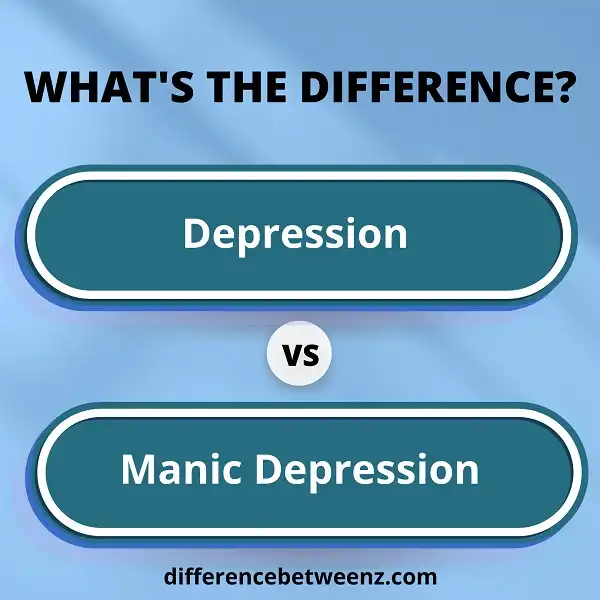Manic depression, also known as bipolar disorder, is a mental illness that causes unusual shifts in mood, energy, and activity levels. Symptoms of manic depression can be severe and can interfere with your ability to live a normal life. Depression is a very common mood disorder that affects millions of people each year. While the two illnesses share some common symptoms, there are key differences between them. In this post, we will take a look at the differences between depression and manic depression. We will also discuss the treatments available for both disorders.
What is Depression?
Depression is a mental health disorder that causes a persistent feeling of sadness and loss of interest. Depression affects how you feel, think, and behave, and can lead to a variety of emotional and physical problems. You may have trouble performing routine tasks and may feel that life is not worth living. Depression is more than just a “bad day” – it is a serious medical condition that requires treatment.
Depression is caused by a combination of genetic, biological, environmental, and psychological factors. Treatment for depression may include medication, psychotherapy, or both. If you are depressed, it is important to seek professional help. Depression is a treatable condition, and with proper treatment, you can regain your enjoyment of life.
What is Manic Depression?
- Manic Depression, also known as Bipolar Disorder, is a mental illness that causes extreme mood swings. Individuals with Manic Depression experience periods of both mania and depression, which can last for days, weeks, or even months. Mania is characterized by high energy levels, decreased need for sleep, and impulsive behavior.
- During a manic episode, individuals may feel like they are on top of the world and can do anything they set their mind to. In contrast, depression is characterized by low energy levels, feelings of sadness and hopelessness, and decreased interest in activities.
- Individuals with Manic Depression often feel like they are stuck in a never-ending cycle of ups and downs. Manic Depression can be a very debilitating illness, but there are treatments available that can help individuals manage their symptoms and live fulfilling lives.
Difference between Depression and Manic Depression
- Depression and manic depression are two mental disorders that share some similarities, but there are also some important differences between them. Both Depression and Manic Depression can cause a person to feel sad, anxious, or empty for long periods of time. They can also both cause a person to lose interest in activities that they once enjoyed, to have difficulty concentrating, and feel tired all the time. However, there are some key ways in which Depression and Manic Depression differ.
- One of the most significant differences is that people with depression tend to experience a consistently low mood, while people with Manic Depression often have periods of high energy and positive moods (known as “mania”) followed by periods of low moods. Another important difference is that people with depression are more likely to experience physical symptoms such as headaches or stomachaches, while people with Manic Depression are more likely to experience psychotic symptoms such as hallucinations or delusions.
- Finally, while Depression can be treated with medication and therapy, Manic Depression often requires more intensive treatment including hospitalization. While Depression and Manic Depression share some features, understanding the differences between them is essential for providing effective treatment.
Conclusion
While the line between depression and manic depression may seem blurry, it’s important to understand the difference so that you can get proper treatment. If you or someone you know is struggling with depressive symptoms, please seek professional help. Mania and hypomania should be monitored by a healthcare professional to avoid potential negative consequences.


